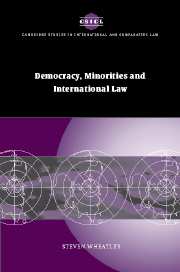Book contents
- Frontmatter
- Contents
- Acknowledgments
- Table of cases
- Table of treaties
- Table of UN resolutions and OSCE and other documents
- List of abbreviations
- Introduction
- 1 The rights of minorities
- 2 The self-determination of peoples
- 3 Democracy
- Conclusion: the accommodation of diversity
- Index
- CAMBRIDGE STUDIES IN INTERNATIONAL AND COMPARATIVE LAW
2 - The self-determination of peoples
Published online by Cambridge University Press: 27 October 2009
- Frontmatter
- Contents
- Acknowledgments
- Table of cases
- Table of treaties
- Table of UN resolutions and OSCE and other documents
- List of abbreviations
- Introduction
- 1 The rights of minorities
- 2 The self-determination of peoples
- 3 Democracy
- Conclusion: the accommodation of diversity
- Index
- CAMBRIDGE STUDIES IN INTERNATIONAL AND COMPARATIVE LAW
Summary
International law recognises a right of cultural security for national, ethnic, cultural, religious and linguistic minorities. The decentralisation of power to local communities increases the possibilities that minority groups may participate effectively in decision-making processes, concerning, for example, language and education policy. For a number of ethno-cultural groups, the desire for political self-government forms part of the collective identity of the group. Members of the group consider that ‘the political and the national unit should be congruent’, and that borders should be drawn, and institutions arranged, ‘to allow the group political freedom from domination by other groups’. In other words, each ‘nation’ should have its own State, if it so desires.
Ethno-cultural groups demanding territorial self-government consider themselves, in the nomenclature of international law, ‘peoples’ (or ‘nations’) rather than ‘minorities’. Reference is made to the right of peoples to self-determination. The rights of persons belonging to minorities and the rights of peoples are related, but distinct. The rights of minorities do not include the right to self-government, either in the form of separation or secession (sovereign self-determination), or territorial autonomy within the State (less-than-sovereign self-determination).
This chapter examines the right of peoples to self-determination. In particular, it considers the implications of the recognition of a right of self-determination for peoples within the State. The following section considers the evolution of the principle of equal rights and self-determination of peoples, recognised in the Charter of the United Nations. The right of self-determination ‘beyond colonialism’ is then considered.
- Type
- Chapter
- Information
- Democracy, Minorities and International Law , pp. 64 - 126Publisher: Cambridge University PressPrint publication year: 2005



